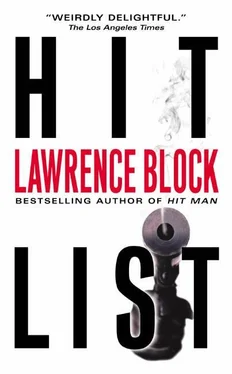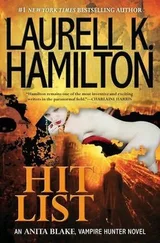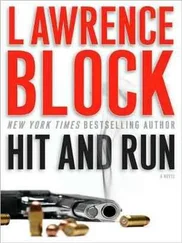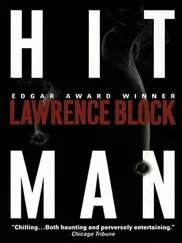“Right.”
“Well, that’s damn smart,” he said. “And from now on it’s how we do business, and not because we’re afraid of the client.”
“But because we’re afraid of Roger.”
“Not afraid exactly, but-“
“But close enough. How’s your veal?”
“It’s fine. What’s that, filet of sole?”
“And it’s nice,” she said, “only a Long Island Iced Tea may not be the best way in the world to pave the way for it. Very nice, though. Delicate. But you’re right, no more airport pickups, no more jerks supplying a car and a gun.”
“Still,” he said, “he must have a way to collect his half in advance. And if you want to send him keys or a gun.”
“FedEx.”
“FedEx to where?”
“A FedEx office, and he calls for it.”
“I don’t suppose it’s the same FedEx office every time.”
“Never the same one twice, never the same city twice. Then afterward when it’s time to pay him, it’s another FedEx office in another city. And the recipient’s name is different each time, too. This guy doesn’t make the obvious mistakes.”
“No.”
“He’s a pro.”
“Right, a pro,” he said. “You know, I got back from Boston and I couldn’t stop looking over my shoulder. I was jumpy, I couldn’t sit still.”
“I can imagine.”
“But you get used to it. At first I thought, all right, I’ll pack it in. Who needs it? I was thinking about retiring that one time, and this time I’ll do it.”
“Neat trick, now that you’ve spent all your retirement fund on stamps.”
“Not all of it,” he said. “A good part of it, but not all of it. But even if I had the money back, even if I could afford to retire, am I going to let this son of a bitch chase me out of the business?”
“I get the sense the answer is no.”
“We’ll be very careful,” he said. “We’ll take a cue from Roger. No face-to-face with the client or any of his people. If they insist, we’ll pass.”
“And I’ll ask some questions I don’t normally ask. Like who turned this job down before you offered it to us? Sometimes a contract goes through different brokers, so the man who calls me may not know who had first refusal, but I’ll make it a point to find out what I can. And if I get a whiff of Roger anywhere near it, I’ll find a reason for us to take a pass.”
“And I’ll keep my eyes open.”
“Never a bad idea.”
“And somewhere down the line,” he said, “we’ll find a way to cut his trail.”
“ ‘Cut his trail’? What’s that mean?”
“They say it in westerns,” he said. “I don’t know exactly what it means. We’ll double back, get behind him, something like that.”
“What I more or less surmised.”
“Well, we’ll do it,” he said. “He’s a pro, but so what? I’m a pro myself, but that doesn’t mean I never make a mistake. I’ve made plenty of them over the years.”
“He’ll make one.”
“Damn right,” he said. “And when he does…”
“Bang bang. Excuse me, better make that pop pop.”
“No, bang bang is fine,” he said. “When I get this guy, I don’t care if I make a little noise.”
Keller, chasing the last forkful of omelet with the last bite of toast, watched while the waitress filled his coffee cup. He wasn’t sure he wanted more coffee, but it was easier to leave it behind than to stop the woman from pouring it for him. The restaurant had signs touting their bottomless cup of coffee. Keller, who’d been brought up to finish what was on his plate, had a problem with that. You couldn’t finish your coffee, they didn’t let you finish your coffee, they refilled your cup before you could empty it. He supposed that was good for people with scarcity issues, but it bothered him.
And what about the tea drinkers? It seemed to him that they got screwed royally. If you finished your tea, they’d give you more hot water to go with the same tea bag. He supposed you could get a second cup of tea out of a tea bag, if you didn’t mind weak and flavorless tea, but a third cup would be a real stretch. Meanwhile, a coffee drinker could polish off gallons of coffee, each cup as strong as the last.
Then again, who ever said life was fair?
“I’d have to say it looks good,” Dot had told him. “The man I talked to is dealing directly with the client, and according to him I’m the first person who got called. And we’ve got a name and address, and a photo’s on its way, and there’s nobody going to be waiting for you at the baggage claim at O’Hare. It’s a pretty safe bet our friend Roger doesn’t know zip about this one, and neither does Klinger.”
“Klinger?”
“The fellow in Lake Forest you’ll be saying hello and goodbye to. He’s not going to be looking over his shoulder. And you won’t have to spend a lot of time looking over your own shoulder, either.”
“Maybe an occasional glance.”
Back at his apartment, Keller’s first glance was at the horoscope Louise Carpenter had drawn for him. The period of great danger, peaking right around the time of his trip to Boston, had passed. Right now he had several relatively safe months ahead of him, at least as far as the stars were concerned. Things might get a bit perilous in the summer, but that was a whole season away.
Still, there was no point in being a damned fool. Lake Forest, Illinois, was on Lake Michigan north of Chicago, and you got there by flying to O’Hare Airport. Keller flew to Milwaukee instead, rented a car, and got a room at a motel fifteen minutes north of Lake Forest.
No rush. The client wasn’t in a hurry, and Klinger wasn’t going anywhere, except to the office and back, five days a week. Keller, keeping an eye on him, kept the other eye open for any sign of an alien presence. If Roger was around, Keller wanted to see him first.
Keller looked at his watch. He had time to finish the coffee in his cup, he decided, but what was the point? She’d only fill it up again, and he’d run out of time before the woman ran out of coffee. He paid the check, left a good tip, and went out to his car, and twenty minutes later he was parked on Rugby Road, a picture-book suburban lane lined with mature shade trees that could have come straight from a Declan Niswander painting. His eyes were focused on a white frame house with dark green shutters standing a hundred yards or so down the road. The motor was idling, and Keller had a street map unfolded and draped over the steering wheel, so that anyone passing by would assume he was trying to figure out where he was.
But he knew where he was, and he knew he wouldn’t have long to wait. Lee Klinger was a creature of habit, as likely to change his routine as the waitress was to leave a coffee cup unfilled. Five mornings a week he caught the 8:11 train to Chicago, and if the weather was halfway decent he walked to the station, leaving the house at 7:48.
You could set your watch by the guy.
Keller, who had set his own watch by the car radio, watched the side door open at the appointed hour. Klinger, wearing a dark brown suit this morning, and carrying his tan briefcase, headed down the driveway and turned left at its end. He walked to the corner, where a traffic light controlled the intersection. He crossed Culpepper Lane with the light, then turned and waited for the light to change so that he could cross Rugby Road. There were no cars coming, so he could have jaywalked safely enough. In fact, Keller thought, he could have proceeded diagonally and crossed both streets at once. But, in the three days he’d been tagging him, Keller had gotten enough of a sense of Lee Klinger to know he’d do no such thing. He’d wait for the light, and he’d cross streets the way you were supposed to cross them.
Читать дальше












